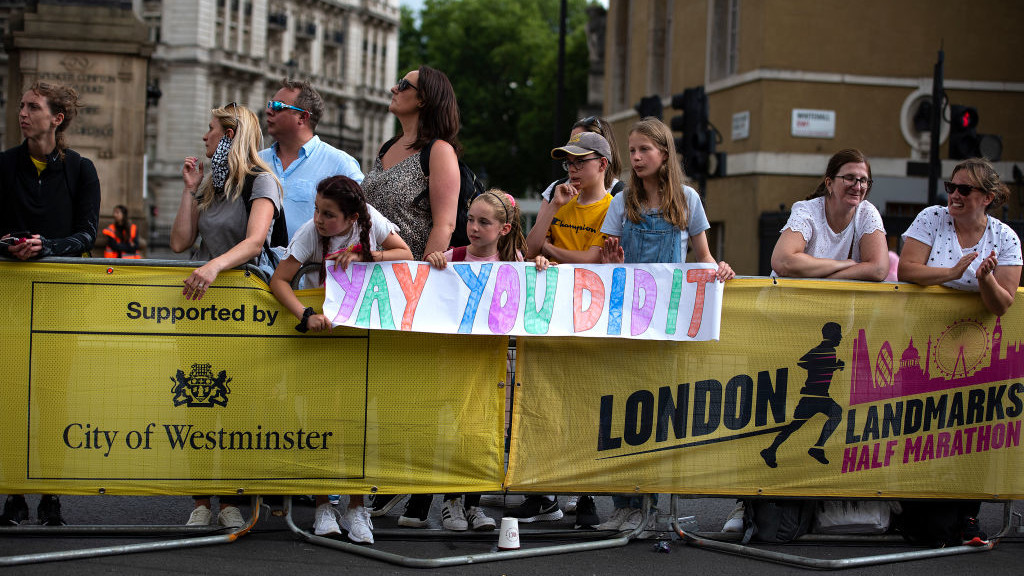Half Marathon Tips To Help You Train And Run A Better Race
Use this expert advice to improve your training and excel on race day

If you’ve signed up for a half marathon, you probably don’t need us to tell you that it’s a long way to run in one go. While training for it is less demanding than for a full marathon, in that you don’t need such a comprehensive nutrition strategy for your race and the long runs are far more manageable, it’s still smart to plan how you are going to approach your preparation and race day itself.
To aid you in that endeavor we have these tips from James Thie, coach at Coopah, official training partner of the London Landmarks Half Marathon, and Carl Martin, personal training manager at elite training service E by Equinox.
Half Marathon Training Tips
Follow A Training Programme To Suit Your Level
Whether you’re an experienced runner racing for a time or you’re planning to complete the distance for the first time, it’s easy to feel lost without a structured training plan. We have half marathon training plans for all levels.
If you’re worried you won’t stick to the plan, keep a training diary. It’s a great way to increase accountability, and looking back on all you have achieved before race day can be motivating.
You Don’t Need To Run The Full Distance In Training
“You achieve the fitness to accomplish the race by logging frequent runs,” says Martin. “Completing the distance on the day is mostly a mental challenge—pushing past low moments and coping with discomfort.”
Use Your Long Runs To Prep For Race Day
“Long runs are great chances to prep some of the little things for race day,” says Thie. “It could be getting up at race time. What you’re going to eat before the run, not just in the morning but the day before as well. What your hydration strategy is. What your timeline is in terms of eating. If you’re a caffeine person, what you’re going to have. It’s much better to be caught short on that long run, or not feel great on that run, and know what you have to modify for race day.
“The same applies to kit. You don’t have to run in your full race kit, but you might have an idea. Don’t pull out a brand new pair of running shoes on race day, or try your running T-shirt or vest for the first time and then realize it can chafe. The same goes for running shorts.”
Sign up for workout ideas, training advice, reviews of the latest gear and more.
Practice Your Nutrition
“The majority of people will use running gels during the run,” says Thie. “Certain races will have their own sponsors and partners, so if you’re not going to carry your own gels, do some homework on the gels that races have on the course. There’s often great information on their website for that.
“And practice. If you’re not used to a gel and pick it up halfway through a race to try it for the first time, that’s never the best thing. Try it during some training runs, because everyone’s stomach responds differently.”
Cross-Training And Strength Workouts Can Help
“Endurance activities like running call for lots of movement in one plane of motion,” says Martin. “Restoring balance with lateral and rotational exercises is essential. Try something like rock climbing, swimming or dancing. The goal is to vary the stress being placed on your body.
“Lifting weights can help balance the running training by reducing the chance of injury, enhancing recovery and increasing speed. Lower back aches can be a common complaint for new runners or those increasing the number of miles they run in a week. Working on your glutes and core can help.”
Our guide to strength training for runners will introduce you to the fundamentals.
Be Mindful Of Your Injury Risk
“The quickest way to derail your training is by getting injured,” says Martin. “Ensure you warm up properly, keep your pace in check while training and racing, include recovery strategies such as mobility work in your training, and try to get the best sleep possible before race day.”
Half Marathon Tips For Race Day
Take Hydration Seriously
“Make sure you stay hydrated throughout the day before race day,” says Martin. “Look at the race map and locate the water stations along the route to help decide whether to take a bottle with you or not.”
Monitor Your Breathing
“With the excitement of race day it’s common for runners to set out too fast and falter later in the race,” says Martin. “Staggered breathing can help you stay focused and improve running performance. To stagger your breath, inhale for three steps and exhale for two. Counting requires focus, which will prevent you from going into autopilot as your body tires and your mind starts to wander.”
If you’re interested in how your breath can affect your running, these breathing exercises for runners can aid performance, but steer clear of nasal breathing during the race—when pushing hard, breathing through your mouth is a lot more efficient in getting you the oxygen you need.
We also have a guide to how to pace a half marathon which will help you plan a pacing strategy.
For more information on the London Landmarks Half Marathon visit llhm.co.uk

Nick Harris-Fry is a journalist who has been covering health and fitness since 2015. Nick is an avid runner, covering 70-110km a week, which gives him ample opportunity to test a wide range of running shoes and running gear. He is also the chief tester for fitness trackers and running watches, treadmills and exercise bikes, and workout headphones.
